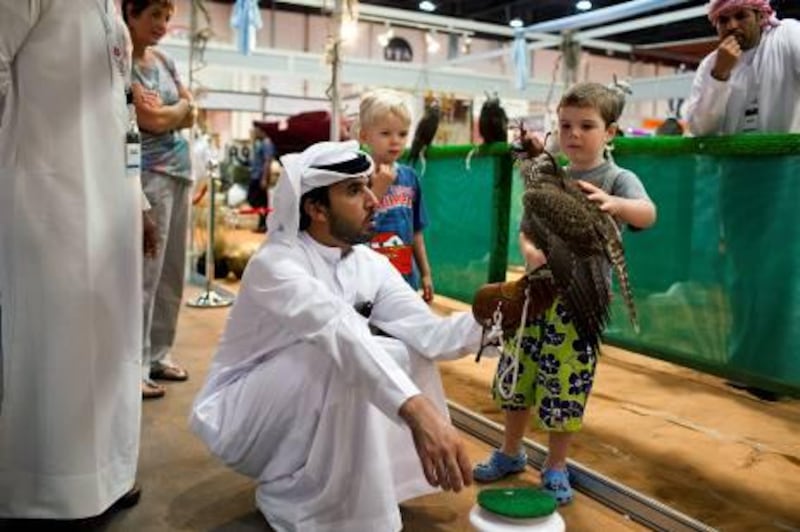ABU DHABI // As Adel Enzo's falcon soared away from him during a hunt several years ago, something in his stomach told him he would not see her again.
The bird, named Diat, "was just about the most beautiful falcon I had, and it hurt to lose her," he said. Mr Enzo, who owns 20 falcons and bought another this weekend at the Abu Dhabi International Hunting and Equestrian Exhibition (Adihex), now attaches a tiny transmitter to his birds while training them. "I would never let them go without one, because there's a good chance I will lose them forever," he said. Almost all the other trainers he knows also use the devices.
The next development, though, is just around the corner: global positioning satellite systems. Marshall Radio Telemetry, the American company that sold Mr Enzo his transmitters, expects to have GPS devices available within the next year. The main hurdle, according to Robert Bagley, the president of Marshall, is making the sophisticated equipment small enough for the falcon to carry easily. The current transmitters weigh nine grams and are entwined in the bird's tail feathers, on the back of its neck or attached to its leg. The trainer uses a tracking receiver that beeps more rapidly as the range narrows.
The transmitters have a range of 60km, and a battery that lasts for six to 10 days. They sell for Dh1,300 each, while the receiver costs about Dh4,500. After the falcon launches toward its prey, the trainer has to locate the bird before it finishes its meal and flies off on another hunt. Often enough, the falcon fades into the distance after leaving the trainer's arm. He then has to scramble to reunite with the bird in time.
Ali bin Hassan, a telecommunications engineer from Bahrain, has been using the transmitters for about nine years. He has 106 falcons, 19 of which he trains every day. He has never lost a falcon, but once came close. It took him three days to find the bird, having to stop his car every 200 to 300 metres and climb on the roof to pick up a good read on the receiver. "He took the wind, crossing rivers and mountains, and I didn't know if I would see him again," he said. "It took so long to realise whether he was 3km away or 10km away, if he went east or west. Much time was wasted."
A GPS system "will take the guessing out and make it much easier to find," he said. However, GPS devices demand far more power, making them either heavy or short-lived. Another obstacle is the availability of mapping data and global coordinates in remote desert areas, where falcons are often flown. "We have to find the perfect balance of the smallest, the lightest, the farthest range and the most reliable piece of equipment," Mr Bagley said.
"The current technology may not be as convenient as GPS, but it allows enough time to find the falcon, and that's the most important thing." Trainers who opt not to use transmitters "don't allow their birds to get strong," Mr bin Hassan said. "I can give my falcons vitamins and hope they can fly long and far, as long as I know I can find them eventually. They do not return to you like a loyal dog. It's up to you as a falcon owner to bring them back home," he added.
He has managed to train birds to wait next to their kill until he arrives - but only a few. Even for them, he uses transmitters just in case. "I spend more time with my birds than with my own family," he said. "They understand my sound and my steps, and I can't bear to imagine them out in the world without me." Last night, Adihex came to a close after a series of exhibits that included weapons displays, a saluki beauty contest, a coffee brewing competition and 100 falcons donated by Sheikh Khalifa bin Zayed, President of the UAE.
One of the last events was the final of the "smooth" category of the Saluki Beauty Contest. Azir, owned by Ahmed Salem al Tunaiji, won Best in Show in the male category, while Arda, owned by Mahammed Massoud, won the same award among the females.
econroy@thenational.ae






